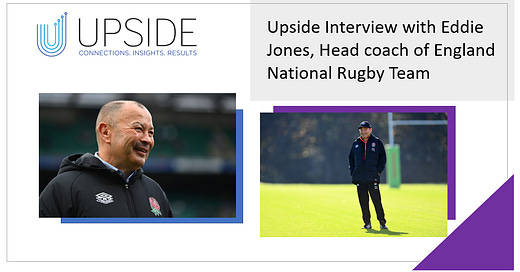This week we had the honor to interview Eddie Jones, the head coach of England National Rugby team. Eddie Jones is an Australian rugby union coach.
Eddie Jones previously coached Australia between 2001 and 2005, taking the team to the 2003 Rugby World Cup Final. He was an assistant coach for South Africa when the Springboks won the 2007 Rugby World Cup and from 2012 to 2015 he coached Japan, leading them in the 2015 Rugby World Cup and their upset win over South Africa. As the head coach for England he led them to win the 2016 Six Nations Championship and the 2017 Six Nations Championship, becoming only the second international rugby team to go the entire calendar year unbeaten. He led England to the 2019 Rugby World Cup final where they lost to South Africa.
📝Show Notes: Through this interview, we touched on load management, the importance of technologies in the world of pro rugby. We also discussed his favorite technologies and the types of technologies that he would build if had unlimited resources.
🚀Best Quotes: Here’s some of the key discussion points and best quotes from our conversation with Eddie:
On load management: “Load management's obviously an interesting topic at the moment. The most important thing is for the players to be physically equipped to play the game, that's the number one thing. So we're always looking at: What does the game require? What are our players required to play the game as it is? And obviously play the game at the highest intensity. So we look at it very much from a global point of view in terms of the game, and then individually in terms of what each player needs to do to be at their best for the game on the Saturday.
On the potential pressure of the media to play certain players: “The media pressure's got nothing to do with it. In terms of the best thing for each player, that's where the pressure's on. Because sometimes you got to play a player that maybe your best player at 90%'s is better than your next best player at a 100%. So you're always trying to balance that up. What level is that player at, or your best player's at? If he's not at his best level then is he still better than the player who's at a 100%?”
On the importance of technology in the world of pro rugby: “Well technology is the accelerator. It accelerates performance and we're all looking for that 1% or 2% difference. So they're enormously important. And I think over the next period of time, they're going to become even more important”.
On his favorite technologies: “GPS set the path for rugby teams back in 2005. I remember with the Wallabies, we were using a GPS system which was the size of the old Motorola phones on the back of the players. And it gave us some good information about how we had to train and what the game required. And increasingly that form of technology, GPS, has become more refined. What we don't have at the moment is the ability to measure particular movements off the ball. And that's something we're investigating very, very closely at the moment”.
On emerging technologies (Sleep tech, hydration assessment tools..) : “They're all interesting. And we use them from time to time, particularly in the recovery area. I think technology has accelerated the ability to give players more individual recovery practice and learn more about their bodies. And I think going forward as the game progresses, every game in the world gets faster, and it is more intense, because that's what people want to see. And therefore the recovery from those more intense performances and in the way technology can give you more accurate information for the coaching staff and more accurate information for the player to learn about themselves and find ways to recover better is absolutely vital”.
On the types of technology that he would build if he has unlimited resources: “The one thing we don't know is when a player's ready to play. If we had a psycho biological model of being able to say, this player is riding the range of playing, that we were able to put all that together into a algorithm and say, this player is ready, then that would be a game changer wouldn't it?”.
You may also like:
⭐ ⌚ Upside: HR/HRV Monitoring Market (Key vendors, Trends & Recommendations to Teams)
🔮 2022 Upside Top Sports Tech Predictions (NFT/Metaverse, Sports Performance, IPOs/M&As..)
🔥 Upside Chat: Sean Harrington, Notemeal CEO (Online platform for nutritionists and dietitians)















Share this post